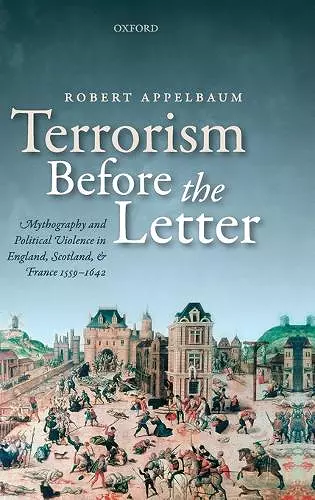Terrorism Before the Letter
Mythography and Political Violence in England, Scotland, and France 1559-1642
Format:Hardback
Publisher:Oxford University Press
Published:10th Dec '15
Currently unavailable, and unfortunately no date known when it will be back

Beginning around 1559 and continuing through 1642, writers in England, Scotland, and France found themselves pre-occupied with an unusual sort of crime, a crime without a name which today we call 'terrorism'. These crimes were especially dangerous because they were aimed at violating not just the law but the fabric of law itself; and yet they were also, from an opposite point of view, especially hopeful, for they seemed to have the power of unmaking a systematic injustice and restoring a nation to its 'ancient liberty'. The Bible and the annals of classical history were full of examples: Ehud assassinating King Eglon of Moab; Samson bringing down the temple in Gaza; Catiline arousing a conspiracy of terror in republican Rome; Marcus Brutus leading a conspiracy against the life of Julius Caesar. More recent history provided examples too: legends about Mehmed II and his concubine Irene; the assassination in Florence of Duke Alessandro de 'Medici, by his cousin Lorenzino. Terrorism Before the Letter recounts how these stories came together in the imaginations of writers to provide a system of 'enabling fictions', in other words a 'mythography', that made it possible for people of the sixteenth and seventeenth centuries to think (with and about) terrorism, to engage in it or react against it, to compose stories and devise theories in response to it, even before the word and the concept were born. Terrorist violence could be condoned or condemned, glorified or demonised. But it was a legacy of political history and for a while an especially menacing form of aggression, breaking out in assassinations, abductions, riots, and massacres, and becoming a spectacle of horror and hope on the French and British stage, as well as the main theme of numerous narratives and lyrical poems. This study brings to life the controversies over 'terrorism before the letter' in the early modern period, and it explicates the discourse that arose around it from a rhetorical as well as a structural point of view. Kenneth Burke's 'pentad of motives' helps organise the material, and show how complex the concept of terrorist action could be. Terrorism is usually thought to be a modern phenomenon. But it is actually a foundational figure of the European imagination, at once a reality and a...
This ambitious work has a great deal to offer scholars of early modern history as well as the study of terrorism ... His thesis that there is a nascent 'line of descent' in terrorist violence, from the ancient world, to the early modern, to the modern day, is compelling. It suggests new directions for historians of violence when considering early instances of terror, and convincingly argues for a broader approach to critical terrorism studies. * Jane Fitzgerald, Parergon *
Terrorism before the Letter carefully recovers the literary history of a so-called mythography of terrorism that Robert Applebaum locates in the bloody religious conflicts of early modern Europe. While boldly considering early modern political violence as terrorism, Applebaum argues that literature must be discussed by scholars of terrorism more broadly ... Terrorism before the Letter offers a timely contribution to terrorist studies. * Alexander D. Campbell, Times Literary Supplement *
...the book provides a model of applying present-day ways of thinking about terrorism to the past, while respecting that past on its own terms. The result leads to a number of insights, many of them brilliant, that would bene?t all who are interested in questions of violence and its many representations. * Sarah Covinton, The Graduate Center and Queens College, CUNY, Renaissance Quarterly *
...this is a book to make historians think. His stated goals are to push critical terrorism studies towards a richer engagement with literary analysis, and to provide contemporary debates with a sense of how vested Western culture has been in the imaginary of terrorism (p. 27). But his book deserves to stimulate historiographical debate, not only about violence, terrorism and writing, but also about the possibility of transnational comparative approaches to the darker passages of the European past. * Alastair Bellany, English Historical Review *
ISBN: 9780198745761
Dimensions: 241mm x 160mm x 21mm
Weight: 558g
284 pages